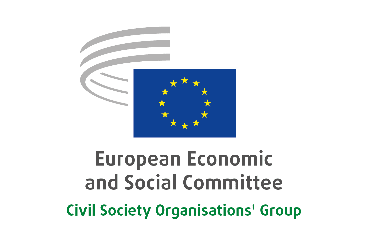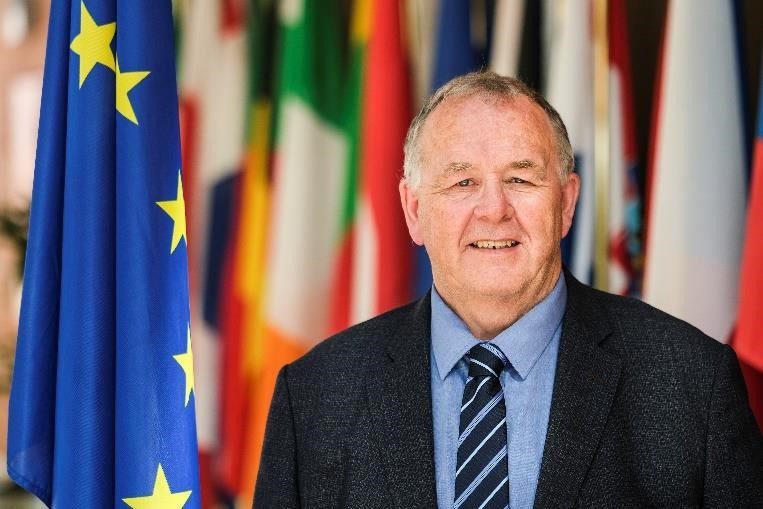
On 14 December, members of the Civil Society Organisations’ Group of the European Economic and Social Committee (EESC) re-elected Séamus Boland as president of the group for another two and a half years, by acclamation.
Séamus Boland will chair the group for his second half-term, from April 2023 to September 2025. The Irishman, who is a farmer and represents an organisation for rural and community development at the Committee, has chaired the group since October 2020. Mr Boland has been a member of the Committee since 2011.
The eradication of poverty and the role of civil society organisations (CSOs) in combatting poverty will remain the overarching priority during his presidency.
“Poverty is heading for an all-time high as a consequence of COVID-19, climate change and the geopolitical turmoil due to the war in Ukraine. It affects all spheres of life and prevents us from achieving a sustainable future for all,” says Séamus Boland. “Poverty eradication therefore remains the overriding priority of my presidency and civil society organisations play a pivotal role in combatting poverty. CSOs help voice local concerns, define local needs and find local solutions. This is crucial for attaining the first Sustainable Development Goal, which is to eradicate extreme poverty everywhere.”
For 2023, Séamus Boland proposes concentrating the work of the group on the following priority areas:
- Resilient European health and care systems;
- Climate change, energy poverty and vulnerable groups;
- Skills, digitalisation and vulnerable persons;
- The role of civil society organisations (CSOs) in defending and strengthening European democracy;
- Empowering young people and protecting children.
During his first half-term, the Group decided to change its name. On 18 May 2022, it was unanimously decided to change the group’s name from the “Diversity Europe Group” to the “Civil Society Organisations’ Group”.
“Our new name – Civil Society Organisations’ Group – provides our stakeholders with more clarity about the Group’s composition and mission,” said Mr Boland. “The renaming was especially timely, in light of the final report of the Conference on the Future of Europe, which proposes enhancing the institutional role of the Committee and empowering it as facilitator and guarantor of participatory democracy.”
During its meeting, the Civil Society Organisations’ Group also elected its candidates for other leadership positions at the Committee for the second half of the 2020-2025 term:
- Krzysztof Pater for the EESC Vice-Presidency in charge of Budget
- Baiba Miltoviča for the Presidency of the Section for Transport, Energy, Infrastructure and Information Society (TEN)
- Ioannis Vardakastanis for the Presidency of the Section for Economic and Monetary Union and Economic and Social Cohesion (ECO)
- Panagiotis Gkofas for Quaestor
These nominees will be confirmed by vote during the Committee’s mid-term renewal in April 2023.
Background:
The EESC is a consultative body that gives representatives of Europe’s socio-occupational interest groups and others a formal platform to express their points of view on EU issues. Its opinions are addressed to the Council, the European Commission and the European Parliament. It thus has a key role to play in the Union’s decision-making process.
Mr Boland’s Curriculum Vitae and more information on the elected candidates for other key positions are available on the EESC’s website.
Presidential terms are linked to the EESC’s renewal and mid-term renewal every two and a half years, unlike the terms of EESC members, who are elected for five years.
The EESC itself has a rotating presidency system. The 2023-2025 EESC President will come from the Workers’ Group, the Vice-President in charge of the budget from the Civil Society Organisations’ Group, and the Vice-President in charge of communication from the Employers’ Group. They will occupy these roles until September 2025. The next EESC presidency for the Civil Society Organisations’ Group is due to start in September 2025.
The Civil Society Organisations’ Group (Group III) is one of the three Groups that make up the EESC, alongside the Employers’ and Workers’ Groups. In line with the changes introduced in the Lisbon Treaty, Group III is made up of other representatives and stakeholders of civil society, particularly in the economic, civic, professional and cultural field. Its members are drawn from organisations representing the following fields:
- Academia (natural scientists, economists, sociologists, etc.)
- Citizens’ Participation and Empowerment
- Civil Society Development
- Consumers
- Environment, Heritage and Sustainable Development
- Farming, Fisheries and Coastal Communities, Forestry
- Human Rights’ Protection (Issues concerning children, elderly, families, gender equality, marginalised and underprivileged groups, migrants and refugees, minorities, persons with a disability, women and young people)
- Liberal Professions (lawyers, doctors, engineers, etc.)
- Small and Medium-sized Enterprises and Crafts
- Social Economy (charities, cooperatives, foundations, mutual societies and social enterprises)
For more information, please contact:
Jasmin Klötzing, Communication Officer, Secretariat of the Civil Society Organisations’ Group,
+32 (0)2 546 90 67, [email protected]
The European Economic and Social Committee represents the various economic and social components of organised civil society. It is an institutional consultative body established by the 1957 Treaty of Rome. Its consultative role enables its members, and hence the organisations they represent, to participate in the EU decision-making process.
For more on the EESC
Click Here

